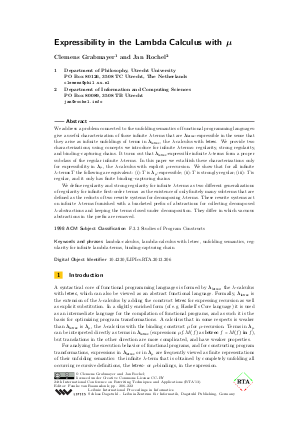Expressibility in the Lambda Calculus with Mu
Authors Clemens Grabmayer, Jan Rochel
-
Part of:
Volume:
24th International Conference on Rewriting Techniques and Applications (RTA 2013)
Part of: Series: Leibniz International Proceedings in Informatics (LIPIcs)
Part of: Conference: International Conference on Rewriting Techniques and Applications (RTA) - License:
 Creative Commons Attribution 3.0 Unported license
Creative Commons Attribution 3.0 Unported license
- Publication Date: 2013-06-24
File

PDF
LIPIcs.RTA.2013.206.pdf
- Filesize: 1.06 MB
- 17 pages
Document Identifiers
Subject Classification
Keywords
- lambda-calculus
- lambda-calculus with letrec
- unfolding semantics
- regularity for infinite lambda-terms
- binding-capturing chain
Metrics
- Access Statistics
-
Total Accesses (updated on a weekly basis)
0Document
0Metadata
Abstract
We address a problem connected to the unfolding semantics of functional programming languages: give a useful characterization of those infinite lambda-terms that are lambda-letrec-expressible in the sense that they arise as infinite unfoldings of terms in lambda-letrec, the lambda-calculus with letrec. We provide two characterizations, using concepts we introduce for infinite lambda-terms: regularity, strong regularity, and binding–capturing chains. It turns out that lambda-letrec-expressible infinite lambda-terms form a proper subclass of the regular infinite lambda-terms. In this paper we establish these characterizations only for expressibility in lambda-mu, the lambda-calculus with explicit mu-recursion. We show that for all infinite lambda-terms T the following are equivalent: (i): T is lambda-mu-expressible; (ii): T is strongly regular; (iii): T is regular, and it only has finite binding–capturing chains. We define regularity and strong regularity for infinite lambda-terms as two different generalizations of regularity for infinite first-order terms: as the existence of only finitely many subterms that are defined as the reducts of two rewrite systems for decomposing lambda-terms. These rewrite systems act on infinite lambda-terms furnished with a bracketed prefix of abstractions for collecting decomposed lambda-abstractions and keeping the terms closed under decomposition. They differ in which vacuous abstractions in the prefix are removed.
Cite As Get BibTex
Clemens Grabmayer and Jan Rochel. Expressibility in the Lambda Calculus with Mu. In 24th International Conference on Rewriting Techniques and Applications (RTA 2013). Leibniz International Proceedings in Informatics (LIPIcs), Volume 21, pp. 206-222, Schloss Dagstuhl – Leibniz-Zentrum für Informatik (2013)
https://doi.org/10.4230/LIPIcs.RTA.2013.206
BibTex
@InProceedings{grabmayer_et_al:LIPIcs.RTA.2013.206,
author = {Grabmayer, Clemens and Rochel, Jan},
title = {{Expressibility in the Lambda Calculus with Mu}},
booktitle = {24th International Conference on Rewriting Techniques and Applications (RTA 2013)},
pages = {206--222},
series = {Leibniz International Proceedings in Informatics (LIPIcs)},
ISBN = {978-3-939897-53-8},
ISSN = {1868-8969},
year = {2013},
volume = {21},
editor = {van Raamsdonk, Femke},
publisher = {Schloss Dagstuhl -- Leibniz-Zentrum f{\"u}r Informatik},
address = {Dagstuhl, Germany},
URL = {https://drops.dagstuhl.de/entities/document/10.4230/LIPIcs.RTA.2013.206},
URN = {urn:nbn:de:0030-drops-40635},
doi = {10.4230/LIPIcs.RTA.2013.206},
annote = {Keywords: lambda-calculus, lambda-calculus with letrec, unfolding semantics, regularity for infinite lambda-terms, binding-capturing chain}
}
